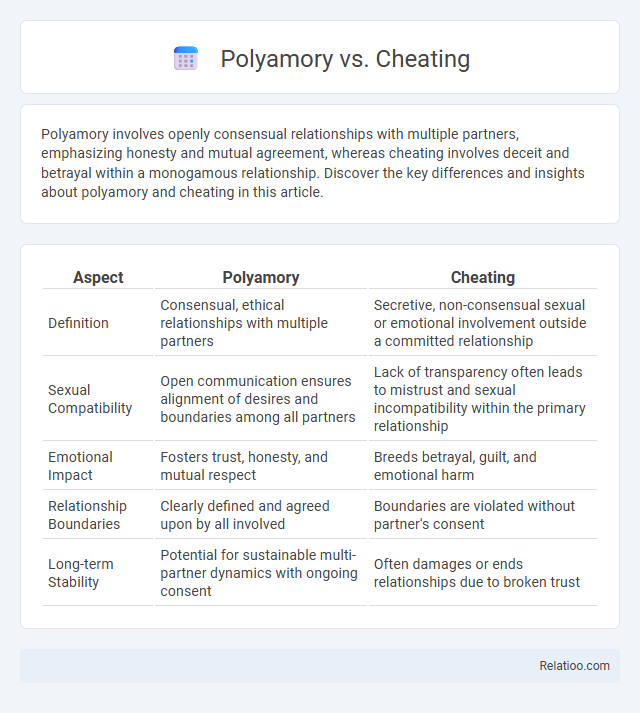Polyamory involves openly consensual relationships with multiple partners, emphasizing honesty and mutual agreement, whereas cheating involves deceit and betrayal within a monogamous relationship. Discover the key differences and insights about polyamory and cheating in this article.
Table of Comparison
| Aspect | Polyamory | Cheating |
|---|---|---|
| Definition | Consensual, ethical relationships with multiple partners | Secretive, non-consensual sexual or emotional involvement outside a committed relationship |
| Sexual Compatibility | Open communication ensures alignment of desires and boundaries among all partners | Lack of transparency often leads to mistrust and sexual incompatibility within the primary relationship |
| Emotional Impact | Fosters trust, honesty, and mutual respect | Breeds betrayal, guilt, and emotional harm |
| Relationship Boundaries | Clearly defined and agreed upon by all involved | Boundaries are violated without partner's consent |
| Long-term Stability | Potential for sustainable multi-partner dynamics with ongoing consent | Often damages or ends relationships due to broken trust |
Understanding Polyamory: Definitions and Principles
Polyamory is a consensual, ethical approach to engaging in multiple romantic relationships simultaneously, emphasizing honesty, communication, and mutual respect among all partners. Unlike cheating, which involves deceit and breach of trust in monogamous commitments, polyamory is based on transparency and informed consent. Understanding polyamory requires recognizing its core principles of autonomy, emotional intimacy, and negotiated boundaries to foster healthy, inclusive relationships.
What Constitutes Cheating?
Cheating involves breaking the agreed-upon boundaries within a committed relationship, typically characterized by secrecy and betrayal of trust, whereas polyamory is based on transparent, consensual agreements between all partners. In polyamorous relationships, multiple romantic connections coexist with full knowledge and consent, distinguishing it clearly from cheating. Understanding that cheating violates explicit or implicit relationship agreements while polyamory emphasizes communication and consent is essential in differentiating the two concepts.
Key Differences Between Polyamory and Cheating
Polyamory involves openly consensual relationships where all parties agree to multiple romantic connections, emphasizing honesty and communication. Cheating constitutes secretive, deceitful behavior violating trust within a monogamous relationship. Your understanding of these key differences is essential for maintaining ethical and respectful interactions in polyamorous dynamics.
The Role of Consent in Relationships
Consent is the fundamental distinction separating polyamory from cheating, as polyamory involves open, honest agreements among all partners about multiple romantic or sexual relationships. In polyamorous relationships, explicit communication and mutual consent establish boundaries and expectations, fostering trust and respect. Cheating occurs when one partner violates these agreements by engaging in secretive or unauthorized relationships, undermining trust and consent.
Communication: Foundation of Ethical Non-Monogamy
Communication is the cornerstone of ethical non-monogamy, distinguishing polyamory from cheating by establishing clear boundaries and mutual consent among all parties. Open, honest dialogue ensures that each partner's needs and expectations are addressed, preventing misunderstandings and fostering trust. Transparent communication practices enable ethical polyamorous relationships to thrive, promoting respect and emotional security.
Emotional Impact: Navigating Trust and Jealousy
Polyamory involves openly consensual relationships where trust is built through communication and agreement, reducing jealousy by fostering transparency and emotional security. Cheating breaks established trust and often results in significant emotional distress, betrayal, and unresolved jealousy due to secrecy and deception. Navigating trust and jealousy in polyamory requires ongoing dialogue and emotional intelligence to maintain healthy connections, contrasting sharply with the emotional harm caused by cheating.
Social Perceptions of Polyamory and Infidelity
Social perceptions of polyamory often emphasize consensual, transparent relationships involving multiple partners, distinguishing it clearly from cheating, which involves deception and betrayal of trust in monogamous commitments. Polyamory is increasingly recognized as a legitimate relationship style supported by open communication and ethical agreements, whereas infidelity typically evokes negative societal judgment due to its association with dishonesty. Research indicates that acceptance of polyamory correlates with greater emphasis on autonomy and non-traditional relationship structures, contrasting sharply with the stigma attached to cheating as a moral transgression.
Legal and Ethical Considerations
Polyamory involves consensual, transparent relationships among multiple partners, emphasizing ethical communication and mutual agreement, whereas cheating breaches trust through secrecy and deception. Legally, polyamorous relationships are not widely recognized, often lacking formal protections available to monogamous couples, while cheating has no legal implications but can impact personal and relational trust. Ethical considerations in polyamory prioritize informed consent and respect for all parties, contrasting with the ethical violations inherent in cheating, which undermines honesty and relational integrity.
Myths and Misconceptions
Polyamory is often misunderstood as cheating, but it is a consensual, ethical practice involving open communication and mutual agreement among all partners, contrasting with the deceit inherent in cheating. Common myths about polyamory include assumptions of jealousy, instability, or lack of commitment, which overlook the trust and emotional management skills that many polyamorous relationships prioritize. Clarifying these misconceptions highlights that polyamory is a distinct relationship style founded on transparency and negotiated boundaries, rather than secrecy or betrayal.
Choosing What’s Right for Your Relationship
Understanding the differences between polyamory and cheating is essential when choosing what's right for your relationship; polyamory involves consensual, ethical non-monogamy with open communication among all partners, while cheating violates agreed-upon boundaries and trust. Establishing clear agreements, boundaries, and mutual respect allows couples to navigate their preferences and avoid misunderstandings. Prioritizing honest dialogue and emotional transparency ensures that relationship choices align with individual values and foster healthy dynamics.

Infographic: Polyamory vs Cheating
 relatioo.com
relatioo.com